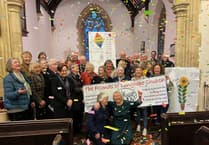People in Gloucestershire can now see how the carbon footprint of their area compares to others elsewhere in country.
Exeter University and the Centre for Sustainable Energy (CSE) have developed a digital tool called Impact which aims to help small communities identify and tackle local carbon footprint hotspots.
A carbon footprint is a measure of the impact human activities have on the environment. It calculates the greenhouse gases and measures them in units of carbon dioxide (CO2).
The new website gives a visual representation of a parish council area’s carbon footprint and people can use the tool to compare their community with the national picture or district council areas.
The tool uses two different but complementary approaches to carbon footprinting: territorial-based reporting and consumption-based reporting.
A territorial footprint looks at all emissions from activities within a particular boundary, such as road and rail travel, industrial and commercial emissions and agriculture, and household energy use.
The consumption footprint also looks at household energy use, but it differs from the territorial approach in that it considers the behaviours and purchases of the people living in that area, including goods and services, much of which are imported from outside – like food, clothing, banking and medical services.
According to the study the Forest of Dean has a carbon footprint of 24.4 tonnes of Co2e (carbon dioxide equivalent) per year.
The idea behind this new tool is that it will give local people usable data on their carbon emissions that is easy to understand and share.
CSE project lead Rachel Coxcoon said: “We know that local authorities and central government are working on climate emergency plans, and that carbon footprinting at these larger spatial geographies is commonly commissioned.
“We know also that many concerned individuals are already using the wide range of personal carbon footprint tools available on the internet.
“But we identified a real gap for carbon footprinting at the small community scale which takes into account the lack of specialist knowledge among community groups and the lowest tier of local government.
“Impact fills this gap. And as well as being clear and useable, it will also give you pointers, once you understand your community’s impact, on what to do next.”
Councillors and clerks from more than 170 parishes across the country helped to test the Impact tool.
Impact is focused on town and parish council level, but they say there is a clear demand for data at other levels, such as electoral ward.
The team is fundraising to be able to meet this demand, and donations can be made by clicking here.
The work was part funded through CSE’s charitable reserve, the Department of Business, Energy & Industrial Strategy, via the Midlands Energy Hub, and the UKRI Strategic Priorities Fund.




